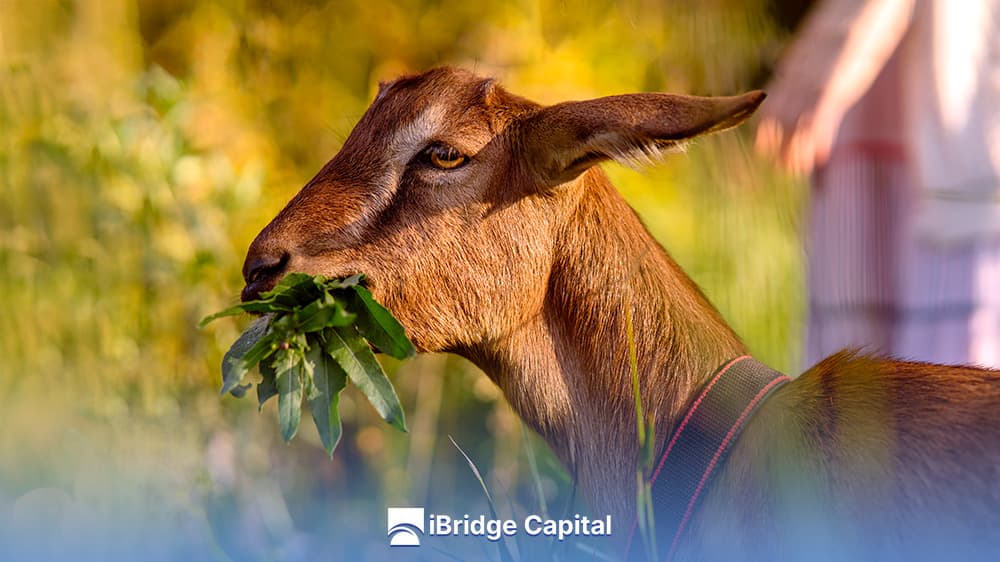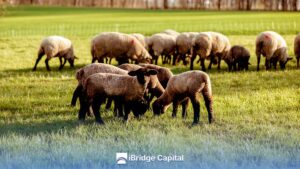Proper nutrition is the cornerstone of goat health and productivity. For any producer or breeder, understanding what goats need to eat is essential. It’s not just about giving them anything; it’s about a nutritional strategy that ensures optimal development, good milk or meat production, and overall well-being.
A proper diet prevents diseases, strengthens their immune system, and ensures that goats live a long, productive life. Goat nutrition is a science that combines knowledge of their biology with the management of available resources.
Basic Principles of Goat Nutrition
Goats are ruminants, which means they have a specialized digestive system that allows them to process cellulose from plants. Their nature as browsers distinguishes them from grazing cattle. Goats prefer shrubs, branches, and leaves over short grasses.
Understanding this difference is the first step toward a successful goat diet. Their stomach is designed to digest fiber, so a forage-based diet should be their main source of food.
The amount of food a goat needs varies with its weight, age, and productive stage. The question of how much a goat eats per day is common, but the answer is more complex than a simple number. An animal can consume about 3% to 5% of its body weight in dry matter, but this can change drastically if it is pregnant or lactating.
Goat Nutritional Requirements
A goat’s body needs five basic components: water, carbohydrates, proteins, vitamins, and minerals. Goat nutritional requirements are not static; they change throughout their life. For example, a growing or lactating goat needs more protein and energy than one in maintenance. Goat herd nutrition must consider each of these stages to ensure proper growth and prevent deficiencies.
A balanced goat diet should include a combination of forage, concentrates, and supplements. Forages (pastures and hay) are the source of fiber and energy. Concentrates and grains provide the extra protein and energy needed during certain stages. Minerals and vitamins, while required in small amounts, are crucial for bone development, reproduction, and disease prevention.
Why a Balanced Diet Is Essential
An unbalanced diet can have serious consequences. A lack of protein can affect milk production and fiber growth. Energy deficiency can result in weight loss and lack of vitality. On the other hand, an excess of grains can cause digestive problems like acidosis.
Nutritional management in goats is key to avoiding these issues. A balanced diet not only promotes health but also optimizes the animal’s productive performance. A well-fed goat is more resistant to disease and has a longer life expectancy. This is a fundamental principle that every breeder should keep in mind.
The Pillars of the Goat Diet: Forages and Pastures
Goat forage is the foundation of their diet. It is their main source of fiber, which is essential for the proper functioning of their digestive system. Forage can be fresh (pasture and foliage) or conserved (hay or silage). Goats, being browsers, enjoy variety. A pasture with a mix of herbs, weeds, shrubs, and branches is ideal for them.
Goat grazing allows them to select their own diet. Goats are selective and prefer the most nutritious parts of plants. Their instinct helps them find the food they need. Pasture for goats is an economical and natural food source, but it is not always enough on its own to meet their nutritional needs.
The Importance of High-Quality Forage
Quality forage for goats is crucial. If the pasture is scarce or of low quality, the goat will not be able to get the necessary nutrients. Good quality hay is an alternative when fresh pasture is not available. Hay for goats should be green, dust-free, have a fresh smell, and be leafy. Alfalfa hay is an excellent option due to its high protein and calcium content.
It’s recommended that forage makes up at least 75% of an adult goat’s diet. Quality forage for goats must be free of mold, as mold can cause health problems. It’s a common mistake to think that goats can eat anything. While they are known to be hardy animals, their health depends on the quality of their diet.
Managing Pasture for Better Health
Good rotational grazing for goats is a very effective strategy. This method involves moving the goats to different paddocks regularly. The goal is to prevent them from overgrazing one area and to allow the vegetation to recover. Rotational grazing not only keeps the pasture healthy but also helps break parasite cycles, which contributes to goat health.
The goat feeding management that is based on rotational grazing also promotes a diversity of plants in the goats’ diet. This, in turn, provides them with a wider range of nutrients and natural phytochemicals. For those wondering how to fatten a goat, rotational grazing, combined with proper supplementation, is a very efficient strategy.
The Role of Grains and Supplements in the Diet
While forage is the pillar, concentrates and supplements are necessary during certain stages of a goat’s life. Goat feed, grains, and mineral supplements help meet nutritional requirements that forage alone cannot satisfy.
Goat foods like grains, including corn for goats, are rich sources of energy. These are used in moderation to supplement the diet, especially in goats that are growing, lactating, or being prepared for the breeding season.
Types of Goat Feed and Their Use
Goat feed is a commercially formulated food designed to provide complete nutrition. It is used to complement the forage diet and is designed for a specific purpose, such as milk production or fattening. The amount of feed to give depends on the goat’s life stage and the quality of its forage.
If you’re wondering how much feed a goat eats, the answer is that it should be a small portion of their total diet, generally no more than 1% to 2% of their body weight.
The use of grains for goats must be gradual and controlled. A sudden change in diet can cause digestive problems. A good practice is to mix the grains with the forage so the goat doesn’t consume them all at once. The nutrition of growing goats often requires a greater amount of grains and supplements to support their bone and muscle development.
Vitamins, Minerals, and Salt for Goats
Vitamins for goats and minerals for goats are essential for their health. Calcium and phosphorus are crucial for bone development and milk production. Selenium, copper, and zinc are vital for the immune system. Mineral deficiency is one of the most common diseases from poor nutrition in goats.
Goat mineral salt is the most common way to provide these nutrients. Salt is palatable to goats, which encourages them to consume the necessary amount of minerals. Mineral salt should be provided in blocks or loose in a container, in an easily accessible but rain-protected place. Goat supplements can also include yeasts or probiotics to improve digestion.
Nutrition by Life Stage of Goat Herds
Goats have different nutritional needs throughout their lives. A kid, a pregnant goat, or one that is lactating requires a specific diet to perform at its best. The feeding of breeding goats must be planned for each stage of the animal’s life.
Dairy goats, for example, have very high energy and protein expenditures. If they do not receive proper nutrition, they can lose weight and become sick. The nutrition of dairy goats is a determining factor in the quality and quantity of milk produced. A good dairy goat feeding plan can increase production and prolong the lactation peak.
Feeding Kids and Bucks
The feeding of kids begins with colostrum, the mother’s first milk, which is vital for their immunity. Afterward, they are fed with mother’s milk or a milk replacer. At two weeks of age, they can be offered a small amount of good quality hay and a starter concentrate.
Bucks, which are young males, require specific nutrition for muscle growth. The question of what bucks eat is important, as their diet should be rich in protein for optimal development. As they grow, their diet will be more forage-based, but supplementation is crucial for them to reach their ideal weight. The nutrition of kids is a critical period that sets the foundation for their future health.
Nutrition in Dairy and Pregnant Goats
The nutrition of lactating goats is the most demanding period. Their energy and protein requirements are high to sustain milk production. During this time, their diet should be supplemented with high-quality concentrates and grains.
Pregnant goats also have special needs. The feeding of pregnant goats in the last third of gestation is key for fetal development. During this period, the goat needs an increase in energy, protein, and minerals.
If not provided with a good diet, the kid could be born underweight or the mother could have problems during birth. The feeding of pregnant goats is a fundamental step for a healthy breeding process.
Common Mistakes and Diseases from Poor Nutrition
Goat herd feeding can be a risk factor if not done correctly. An inadequate diet can lead to health problems and diseases. It is important to know what goats cannot eat and what foods are harmful to their health.
Goats are naturally curious and sometimes eat things they shouldn’t. It is therefore crucial to keep them away from poisonous plants for goats such as oleander, mountain laurel, and rhododendron, among others. These plants can be toxic and even deadly. A good practice is to research the plants in your area and remove them from the paddocks.
Forbidden Foods for Goats
The list of forbidden foods for goats is long. They should not eat dog or cat food, meat or animal products, and should never be given foods with molasses or excessive sugars. An excess of grains can lead to acidosis, a painful condition that can be fatal.
Bread, cookies, and other processed foods are not part of a healthy diet for goats. A little won’t hurt them, but in large quantities, they can cause digestive problems and malnutrition. A diet rich in high-quality forage for goats is much better than any type of processed “treat.”
How to Prevent Nutritional Diseases
Nutritional diseases in goats are common if the diet is not adequate. Bloat, acidosis, and enterotoxemia are just some of the conditions that can arise. To prevent bloat, avoid grazing on very wet or very young pastures. Acidosis is prevented by introducing grains gradually into the diet and not giving them more than the recommended amount.
One of the main diseases from poor nutrition in goats is enterotoxemia, caused by the bacterium Clostridium perfringens. This bacterium proliferates in the intestine when there is an excess of fermentable carbohydrates, such as grains. Prevention is achieved with a balanced diet and, in many cases, with vaccination.
Adapting the Diet to Seasonal Cycles
The climate directly influences the type of food available for goats. In summer and spring, fresh pasture is abundant. In autumn and winter, the quality of the forage decreases, and goats need supplements to maintain their weight and health. The feeding of goats in winter must compensate for the lack of fresh pasture.
In winter, the diet should consist mainly of good quality hay for goats, such as alfalfa hay, and supplements. The amount of concentrates should be increased so that the goats maintain their energy and body temperature. The nutrition of goats in winter or the dry season is crucial to prevent weight loss and ensure that the goats are in good shape for the breeding season.
Keys to Successful Feeding Management
Good feeding management is a combination of science and observation. A successful breeder not only knows the nutritional requirements of goats but also observes their animals to detect any problems. The goat’s eyes, weight, and behavior are the best indicators of their health.
Goat nutrition is not just about what they eat, but also about how they are fed. It is important that goats have access to a source of clean, fresh water for goats at all times. Lack of water can lead to dehydration and serious health problems.
Conclusion
Goat herd nutrition is a pillar of their well-being and productivity. A well-thought-out diet that considers the life stage, the quality of the forage, and the need for supplements is the key to a healthy herd.
We invite you to take control of your goats’ nutrition. Plan a diet that suits their needs, use quality forages, and supplement with the necessary minerals and grains. You will see how your animals thrive, their health improves, and as a result, your production grows.




